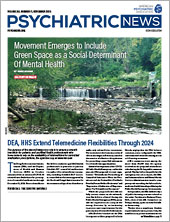APA Provides Feedback on Government’s Role in Regulating Artificial Intelligence
Incorporating artificial intelligence (AI) into mental health care requires unique considerations, APA told Sen. Bill Cassidy, M.D. (R-La.), in a
letter. Cassidy, who is ranking member of the Senate Committee on Health, Education, Labor, and Pensions (HELP), requested feedback from stakeholders on the role that the government plays in regulating the AI industry, as well as ensuring AI technology is designed, developed, and deployed in a responsible manner.
“The presence of AI-driven tools in clinical care carries unique opportunity and risk for the treatment of mental illness and substance use disorder,” APA’s letter, signed by CEO and Medical Director Saul Levin, M.D., M.P.A., stated. The opportunities include allowing physicians to focus on patient engagement rather than clerical work and reducing administrative burden.
However, AI technologies also carry unique risks for people with mental illness, including enhancing avoidant behavior, paranoia, or discomfort, as well as exposing patients to untested interventions. Patients with limited access to care could be shunted into lower-quality, automated care rather than having their psychiatric needs addressed using evidence-based medicine, the letter stated. “As such, these technologies risk worsening health disparities, particularly if they are insufficiently tested.”
Group of Six Urges Congress to Strengthen, Diversify Physician Workforce
APA and its partner organizations, collectively known as the Group of Six, urged House and Senate leaders in a letter to act before the end of the year to advance policies aimed at strengthening and diversifying the physician workforce. The Group of Six is made up of APA, the American Academy of Family Physicians, the American Academy of Pediatrics, the American College of Obstetricians and Gynecologists, the American College of Physicians, and the American Osteopathic Association.
The letter was addressed to then Speaker of the House Rep. Kevin McCarthy (R-Calif.), House Minority Leader Rep. Hakeem Jeffries (D-N.Y.), Senate Majority Leader Sen. Chuck Schumer (D-N.Y.), and Senate Minority Leader Sen. Mitch McConnell (R-Ky.). The organizations urged the leaders to focus on several pieces of legislation, including reauthorizing vital programs that expired September 30: The Conrad State 30 program and the Teaching Health Center Graduate Medical Education Program.
They also noted additional pieces of legislation that would address challenges facing the physician workforce, including the following:
•
Resident Physician Shortage Reduction Act of 2023 (HR 2389/S 1302), which would gradually raise the number of Medicare-supported graduate medical education positions by 2,000 a year for seven years.
•
Mental Health Professionals Workforce Shortage Loan Repayment Act of 2023 (S 462), which would make mental health professionals eligible for the loan repayment program passed in the SUPPORT Act five years ago.
•
Resident Education Deferred Interest Act (HR 1202/S 704), which would allow borrowers to qualify for interest-free deferment on their student loans while in a medical or dental internship or residency program.
•
Rural Physician Workforce Production Act (S 230/HR 834), which would lift the current cap on Medicare reimbursement payments to rural hospitals that cover the cost of taking on residents, helping to alleviate the disadvantage that rural hospitals face when recruiting new medical professionals.
“The shortage and maldistribution of adult and pediatric primary care, psychiatric, and other high-need specialties limit patient access to cost-effective, preventive care, and these problems will become even more acute in the coming years if no action is taken,” the organizations wrote.
APA Emphasizes Importance of Suicide Screening in EDs
In a letter to the Centers for Medicare and Medicaid Services (CMS) Administrator Chiquita Brooks-LaSure, M.P.P., APA advocated for universal suicide risk screening for all patients in emergency departments (EDs). The letter was written in response to proposed rules that CMS issued related to its Hospital Outpatient Quality Reporting program.
Universal suicide screening of ED patients is “both clinically appropriate and logistically feasible,” APA’s letter, signed by Levin, stated. “However, many practitioners and facilities are currently reluctant or unwilling to expand suicide risk screening, for several related reasons.” Those reasons include the challenges around hospitalization when most of the country is experiencing a shortage of psychiatric beds, as well as concerns about the harm of involuntary hospitalization.
These challenges underscore the urgency of expanding the availability of evidence-based interventions, as well as adequately funding crisis stabilization facilities. “[C]risis facilities vary widely in scope, capability, and populations served,” APA wrote. “This is because they are not currently reimbursed by Medicare and most private insurance plans but instead financed and regulated at the state level via Medicaid and [Substance Abuse and Mental Health Services Administration] block grant funds. We urge CMS to develop standard definitions for facility-based crisis care and payment for these services.” ■
